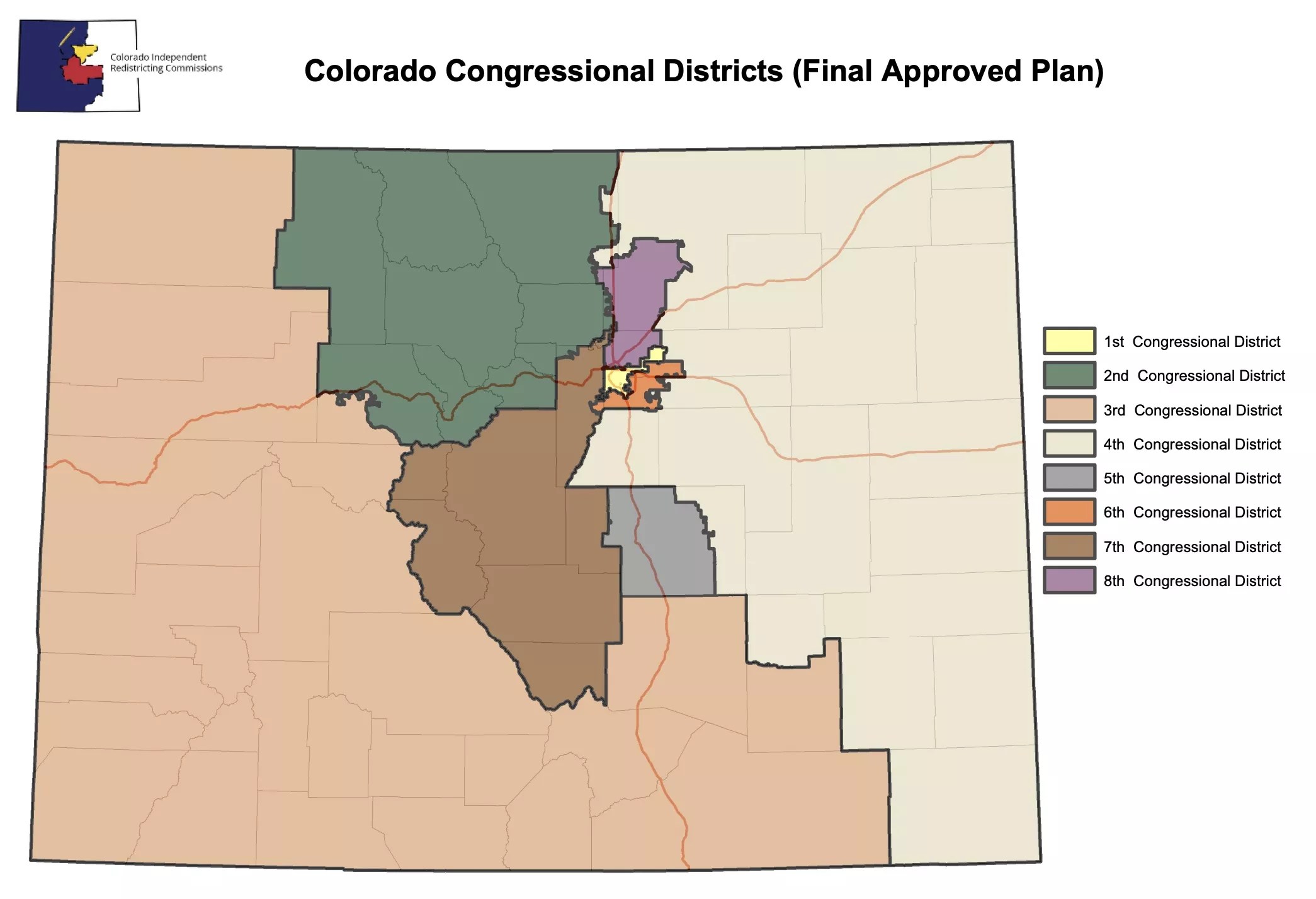
Colorado Independent Redistricting Commission

Audio By Carbonatix
When Texas Republicans decided to perform a mid-decade congressional redistricting last month, the dominoes started falling, from Texas to California, and back to Colorado.
The Texas drama has taken weeks to unfold after the state’s Democratic lawmakers laid low in Illinois in an attempt to stop the partisan gerrymander, which is expected to flip five seats in Congress from D to R. In response, California Governor Gavin Newsom jumped on social media and on camera to declare California would fight back by performing its own partisan gerrymander.
Here in Colorado, where Democrats have a supermajority in the state house, reaction to Texas’s gerrymander was mostly left to commenters on social media…at first.
The state’s constitution was amended by voters in 2018 to establish an Independent Redistricting Commission, composed of four Republicans, four Democrats and four independent voters. The commission’s job: Perform a nonpartisan redistricting after census results come in every decade.
Governor Jared Polis has dismissed suggestions that Colorado respond in-kind to Texas’s assault on democracy. in a statement to Denver7 last month, a governor’s office spokesperson wrote, “As Governor Polis has said many times: This Ain’t Texas – Colorado’s voter-approved Independent Congressional and Legislative Redistricting Commission is in our Colorado Constitution, and adherence to it is not up to the Governor or the legislature’s discretion.”
Polis is correct that the state constitution doesn’t allow for a retaliatory partisan gerrymander. But a constitutional amendment initiated by citizens could pass with 55 percent of the vote.
Loveland resident Jorge Rodriguez was frustrated at what he perceived as a lack of urgency from Colorado lawmakers,
so he posted on Reddit about a grassroots Colorado response to Texas’s redistricting
“I would like leaders here in Colorado to take a stand, and be more combative,” he says.
The conversation soon migrated to a group discussion on Discord, and Rodriguez, along with Wheat Ridge’s Brandon Cary, filed paperwork with the state to create an initiative for the Defensive Gerrymander Guard Act.
The two quickly withdrew their paperwork to fine-tune its language, however. On August 25, their collaborators Luke Lusardi and Philip Bove, both of Denver, filed paperwork for a 2025 election initiative they call the Colorado Election Rigging Response Act (CO-ERRA).
“We knew it might take multiple drafts to get a petition,” Rodriguez says.
As it’s drafted now, the language of CO-ERRA states that emergency redistricting authority would be triggered by a declaration by the governor or a joint resolution passed by majority vote of both chambers of the General Assembly.
In the “Findings of Justification” section, the initiative proposes that redistricting authority can be exercised if substantial evidence exists that the president or any executive branch member attempts to coerce or compel states to adopt congressional maps favoring one party.
“Another state’s compliance with presidential coercion has created partisan distortions of congressional representation that would significantly disadvantage Colorado,” the initiative reads.
If the ballot initiative were to succeed, the governor could suspend the Independent Congressional Redistricting Commission for the remainder of the governor’s current term, and appoint a Temporary Emergency Commission to “redraw congressional districts. using criteria designed to preserve electoral fairness, proportionality, and resistance to federal executive interference,” after which the temporary commission would submit revised congressional maps to the Colorado Supreme Court.
Rodriguez says conventional wisdom offered to his team thus far is that this would be a difficult initiative to pass, given that Colorado passed Amendment Y less than a decade ago. “In 2018, that was a vastly different era, in my opinion,” Rodriguez says.
The state Legislative Council must hold a public review and comment meeting on the proposed ballot question, likely this month, after which the proponents can amend the text of their initiative. If a draft moves forward, it will be filed with the Secretary of State’s Title Board. Once the title is finalized, proponents can begin collecting the estimated 127,225 signatures needed to get the initiative on the ballot.
None of the organizers behind this effort have much as experience as activists, they tell Westword. They’re figuring it out as they go, and that may mean another draft of the initiative has to be submitted before they get a shot at collecting signatures. So far, Rodriguez has registered a committee with the state to back the legislation, the Colorado Emergency Redistricting Powers Committee.
“As long as we’ve got legs, and we started getting donations already, that just shows me there’s a little bit of momentum there,” Rodriguez says. “I just wanted to open up the conversation.”